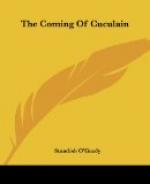Naysi stepped forth from his place, putting aside the ivy with his hands, and came down the dell to meet her in her coming. She did not scream or tremble or show any signs of confusion, though she had never before seen any of the youths of the Gael. She only stood still and straight, and with wide eyes of wonder watched him as he drew nigh, for she thought at first that it was the genius of that glen and torrent taking form in reply to her druidic lay. Then when she recognised the comrade and playfellow of her vision, she smiled a friendly and affectionate greeting. On the other hand, Naysi came trembling and blushing. He bowed himself to the earth before her, and kissed the grass before her feet.
They remained together a long time in the glen and told each other all they knew and thought and felt, save one feeling untellable, happy beyond all power of language to express. When Deirdre rose to go, Naysi asked for some token and symbol of remembrance.
As they went she gathered a rose and gave it to Naysi.
“There is a great meaning in this token amongst the youths and maidens of the Gael,” said he.
“I know that,” answered Deirdre. Deirdre returned to Levarcam.
“Thou hast gathered the flower,” said Levarcam.
“I have,” she replied, “and death and life are one to me now, dear foster-mother.”
Naysi went away through the forest and there is nothing related concerning him till he reached Dun Usna. It was night when he entered the hall. His brothers were sitting at the central fire. Anli was scouring a shield; Ardane was singing the while he polished a spear and held it out against the light to see its straightness and its lustre. They were in no way alarmed about their brother.
“I have seen Deirdre, the daughter of Felim,” he said.
“Then thou art lost!” they answered; the weapons fell from their hands upon the floor.
“I am,” he replied.
“What is thy purpose?” they said.
“To storm the guarded dun, even if I go against it alone, To bear away Deirdre and pass into the land of the Albanagh.” [Footnote: The Albanagh were the people who inhabited the north and west of Scotland, in fact the Highlanders. In ancient times they and the Irish were regarded as one people.]




